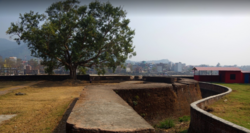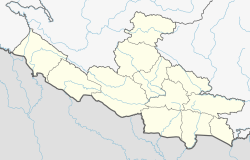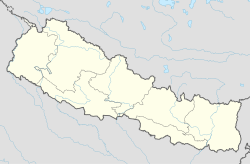Jit Gadhi
| Jit Gadhi | |
|---|---|
जितगढी | |
| Butwal, Lumbini Province in Nepal | |
 Jit Gadhi in 2021 | |
| Coordinates | 27°42′12″N 83°27′34″E / 27.703441600641476°N 83.45955422881201°E |
| Type | Fort |
| Site history | |
| Built by | Kirat dynasty |
| Battles/wars | Battle of Jitgadhi (1814) |
The Jit Gadhi (Nepali: जितगढी; historically known as Butwal Gadhi) is a fort in Butwal, Lumbini Province, Nepal.[1][2] It was built by the Sen dynasty.[3]
The fort was used during the Anglo-Nepalese War (1814–1816) where Colonel Ujir Singh Thapa led Nepal's victory in the Battle of Jitgadhi against the East India Company.[1]
In 2019, the Butwal Sub-Metropolitan City revealed the life-size statue of Ujir Singh Thapa near the fort citing the historic significance.[4] In 2021, a war museum was inaugurated to commemorate the Battle of Jit Gadhi.[5][6]
References
- ^ a b "Jitgadhi Killa to have biggest Nepali flag and Ujir Singh's life-size statute". My Republica. 16 December 2018. Archived from the original on 16 November 2021. Retrieved 16 November 2021.
- ^ "Country's largest national flag to be installed at the site of Anglo-Nepal war". The Kathmandu Post. 17 December 2018. Archived from the original on 16 November 2021. Retrieved 16 November 2021.
- ^ "History of Jitgadi Fort". Castles.today. Archived from the original on 16 November 2021. Retrieved 16 November 2021.
- ^ Anmol, Amrita (21 April 2019). "Butwal organises function to commemorate Jitgadhi victory". The Kathmandu Post. Archived from the original on 16 November 2021. Retrieved 16 November 2021.
- ^ "Butwal to build a war-museum". Khabarhub. 17 March 2021. Archived from the original on 16 November 2021. Retrieved 16 November 2021.
- ^ "बुटवलमा 'जितगढी संग्रहालय' बन्ने". Online Khabar (in Nepali). Archived from the original on 16 November 2021. Retrieved 16 November 2021.
Further reading
- Pande, Bhagawati (28 December 2018). "जाउ है घुम्नलाई जितगढी किल्ला". Setopati (in Nepali). Archived from the original on 16 November 2021. Retrieved 16 November 2021.
- "जितको प्रतीक जितगढी". Annapurna Post (in Nepali). Archived from the original on 16 November 2021. Retrieved 16 November 2021.


